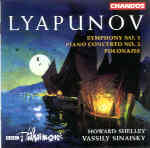The twin influences of Borodin and Tchaikovsky hang over Sergey Lyapunov’s first symphony to the degree that it sounds like the musical equivalent of gene splicing. Structurally, Lyapunov’s effort is akin to Borodin’s second symphony (the same key of B minor, with the inner movements swapped, respectively), but it is certainly not as blunt and direct thematically. Melodic structure and orchestration strongly resemble any large-scale Tchaikovsky work without the memorable tunes. The best that can be said about this particular symphony is that it is a well-crafted, highly enjoyable (especially the charming ballet-like Scherzo), ultimately forgettable homage to Lyapunov’s more original compositional ancestors. Previous “all-Russian” recordings, notably a 1987 Melodiya release with Svetlanov and the USSR Academic Symphony Orchestra, emphasize Borodinian aspects with rasping, heavy-handed bowing in the strings and air-raid siren effects in the brass (particularly when compared with the first movement of Borodin’s Second).
In this new Chandos recording Vassily Sinaisky takes the Tchaikovsky route, offering a more laid-back, smooth-edged rendition that luxuriates in the soaring string lines, the lilt of the woodwind solos, and the lushness of the orchestral tuttis. While the BBC Philharmonic bests its few competitors in this work in ensemble and clarity (enhanced by near state-of-the-art sound that contrasts sharply with the crude Melodiya recording), the present reading nevertheless comes across as a bit too slick and thus lacks the vitality and excitement offered by other “indigenous” groups.
Following the symphony is a tour-de-force piano concerto (the composer’s second) played with bravura and complete mastery by Howard Shelley. Lyapunov, who is best known for his transcendental studies for piano, borrowed again, this time from Liszt (his own second piano concerto), and the results are obvious but not to the point of pastiche. For the most part, this concerto is a showpiece for piano (Arcadi Volodos ought to give it a whirl someday), riddled with cadenzas, brilliant ornamental sections, and rippling scales. The disc closes with an energetic performance of the composer’s Polonaise, an incidental work that makes effective use of the familiar dance motif but makes you long to sing the better version from Eugen Onegin.
































